Nike Marketing Strategy Analysis
VerifiedAdded on 2020/03/16
|20
|3703
|79
AI Summary
This assignment requires a detailed analysis of Nike's marketing strategy across various elements like product, pricing, distribution (place), and promotional activities. The goal is to examine how these strategies contribute to Nike's success, highlighting its competitive advantages and overall impact on the market.
Contribute Materials
Your contribution can guide someone’s learning journey. Share your
documents today.
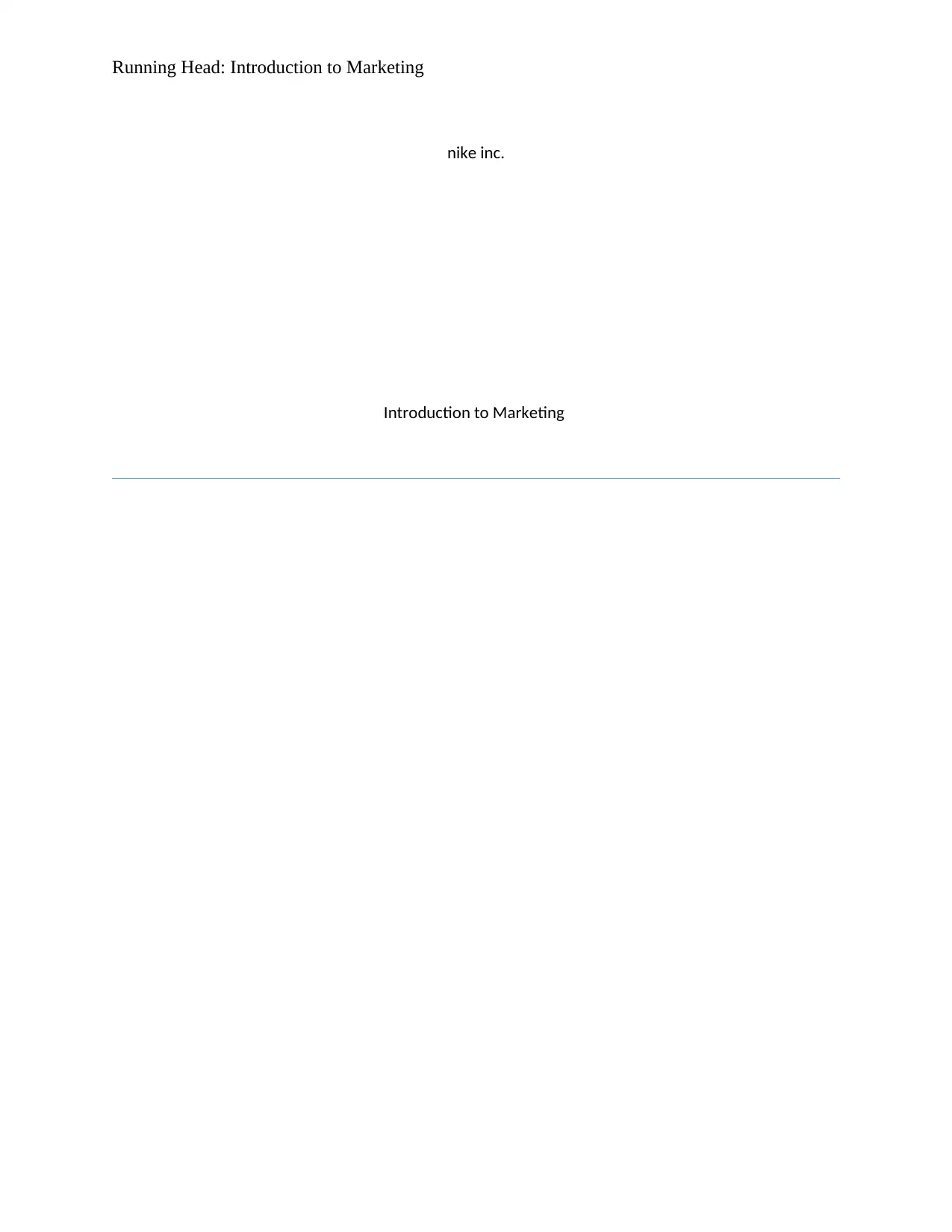
Running Head: Introduction to Marketing
nike inc.
Introduction to Marketing
nike inc.
Introduction to Marketing
Secure Best Marks with AI Grader
Need help grading? Try our AI Grader for instant feedback on your assignments.
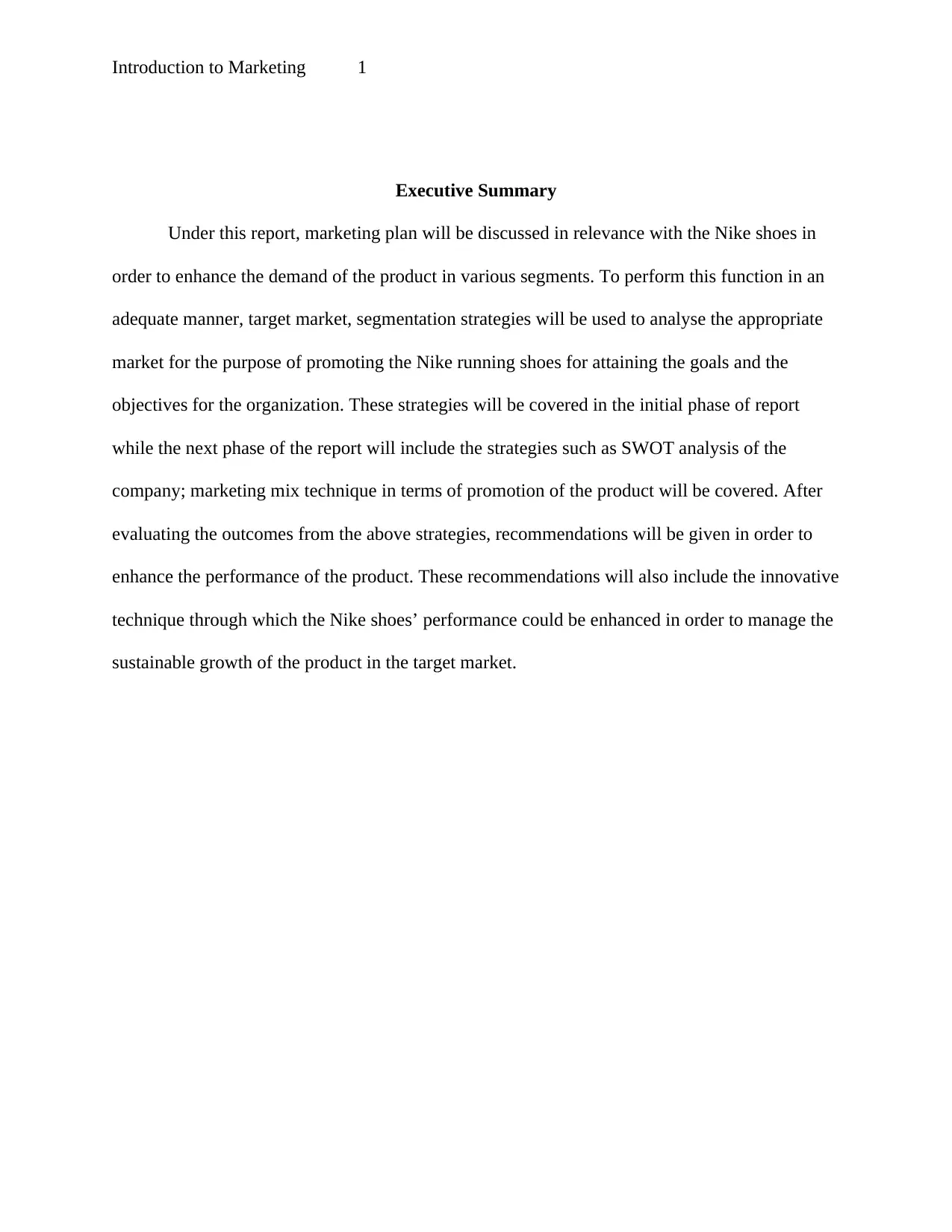
Introduction to Marketing 1
Executive Summary
Under this report, marketing plan will be discussed in relevance with the Nike shoes in
order to enhance the demand of the product in various segments. To perform this function in an
adequate manner, target market, segmentation strategies will be used to analyse the appropriate
market for the purpose of promoting the Nike running shoes for attaining the goals and the
objectives for the organization. These strategies will be covered in the initial phase of report
while the next phase of the report will include the strategies such as SWOT analysis of the
company; marketing mix technique in terms of promotion of the product will be covered. After
evaluating the outcomes from the above strategies, recommendations will be given in order to
enhance the performance of the product. These recommendations will also include the innovative
technique through which the Nike shoes’ performance could be enhanced in order to manage the
sustainable growth of the product in the target market.
Executive Summary
Under this report, marketing plan will be discussed in relevance with the Nike shoes in
order to enhance the demand of the product in various segments. To perform this function in an
adequate manner, target market, segmentation strategies will be used to analyse the appropriate
market for the purpose of promoting the Nike running shoes for attaining the goals and the
objectives for the organization. These strategies will be covered in the initial phase of report
while the next phase of the report will include the strategies such as SWOT analysis of the
company; marketing mix technique in terms of promotion of the product will be covered. After
evaluating the outcomes from the above strategies, recommendations will be given in order to
enhance the performance of the product. These recommendations will also include the innovative
technique through which the Nike shoes’ performance could be enhanced in order to manage the
sustainable growth of the product in the target market.
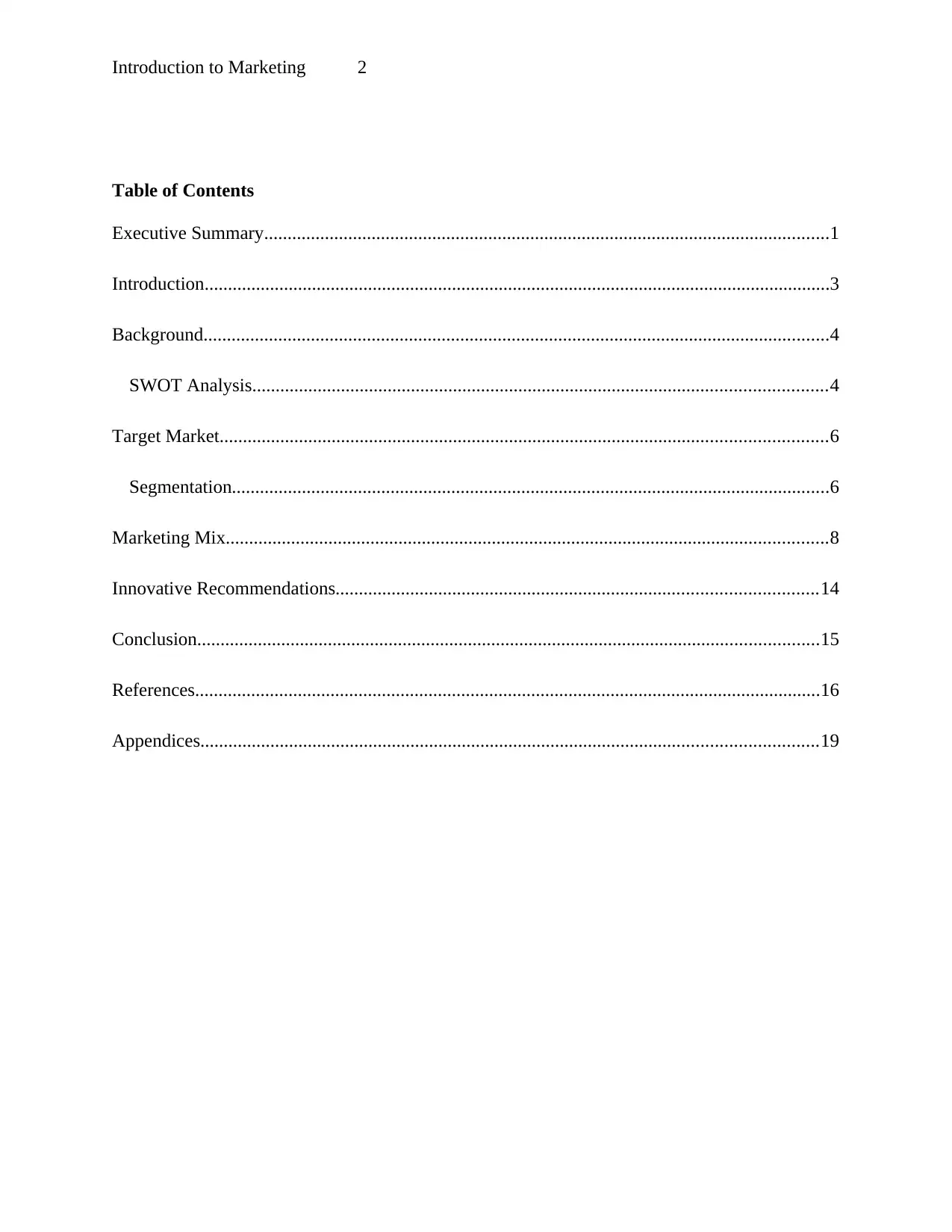
Introduction to Marketing 2
Table of Contents
Executive Summary.........................................................................................................................1
Introduction......................................................................................................................................3
Background......................................................................................................................................4
SWOT Analysis...........................................................................................................................4
Target Market..................................................................................................................................6
Segmentation................................................................................................................................6
Marketing Mix.................................................................................................................................8
Innovative Recommendations.......................................................................................................14
Conclusion.....................................................................................................................................15
References......................................................................................................................................16
Appendices....................................................................................................................................19
Table of Contents
Executive Summary.........................................................................................................................1
Introduction......................................................................................................................................3
Background......................................................................................................................................4
SWOT Analysis...........................................................................................................................4
Target Market..................................................................................................................................6
Segmentation................................................................................................................................6
Marketing Mix.................................................................................................................................8
Innovative Recommendations.......................................................................................................14
Conclusion.....................................................................................................................................15
References......................................................................................................................................16
Appendices....................................................................................................................................19
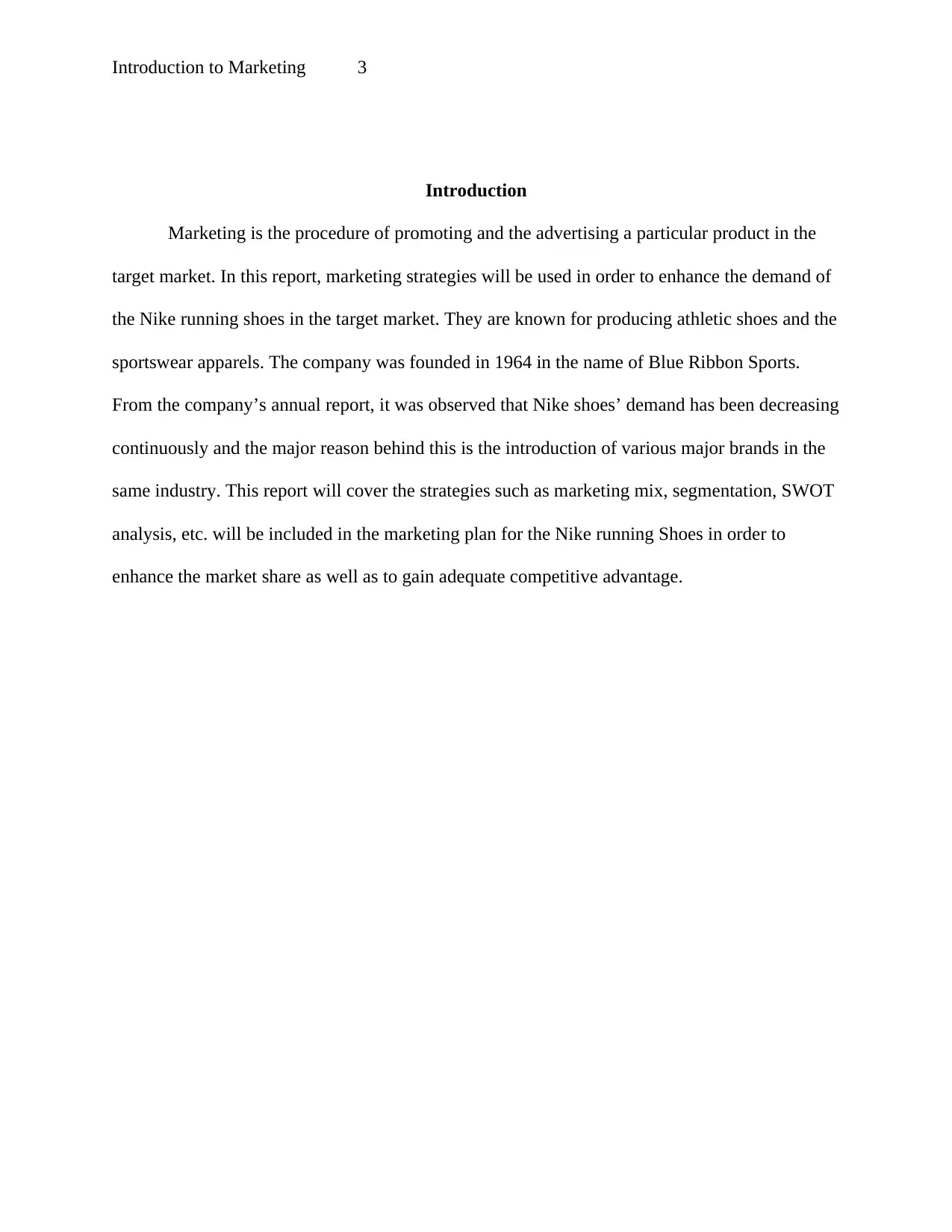
Introduction to Marketing 3
Introduction
Marketing is the procedure of promoting and the advertising a particular product in the
target market. In this report, marketing strategies will be used in order to enhance the demand of
the Nike running shoes in the target market. They are known for producing athletic shoes and the
sportswear apparels. The company was founded in 1964 in the name of Blue Ribbon Sports.
From the company’s annual report, it was observed that Nike shoes’ demand has been decreasing
continuously and the major reason behind this is the introduction of various major brands in the
same industry. This report will cover the strategies such as marketing mix, segmentation, SWOT
analysis, etc. will be included in the marketing plan for the Nike running Shoes in order to
enhance the market share as well as to gain adequate competitive advantage.
Introduction
Marketing is the procedure of promoting and the advertising a particular product in the
target market. In this report, marketing strategies will be used in order to enhance the demand of
the Nike running shoes in the target market. They are known for producing athletic shoes and the
sportswear apparels. The company was founded in 1964 in the name of Blue Ribbon Sports.
From the company’s annual report, it was observed that Nike shoes’ demand has been decreasing
continuously and the major reason behind this is the introduction of various major brands in the
same industry. This report will cover the strategies such as marketing mix, segmentation, SWOT
analysis, etc. will be included in the marketing plan for the Nike running Shoes in order to
enhance the market share as well as to gain adequate competitive advantage.
Secure Best Marks with AI Grader
Need help grading? Try our AI Grader for instant feedback on your assignments.
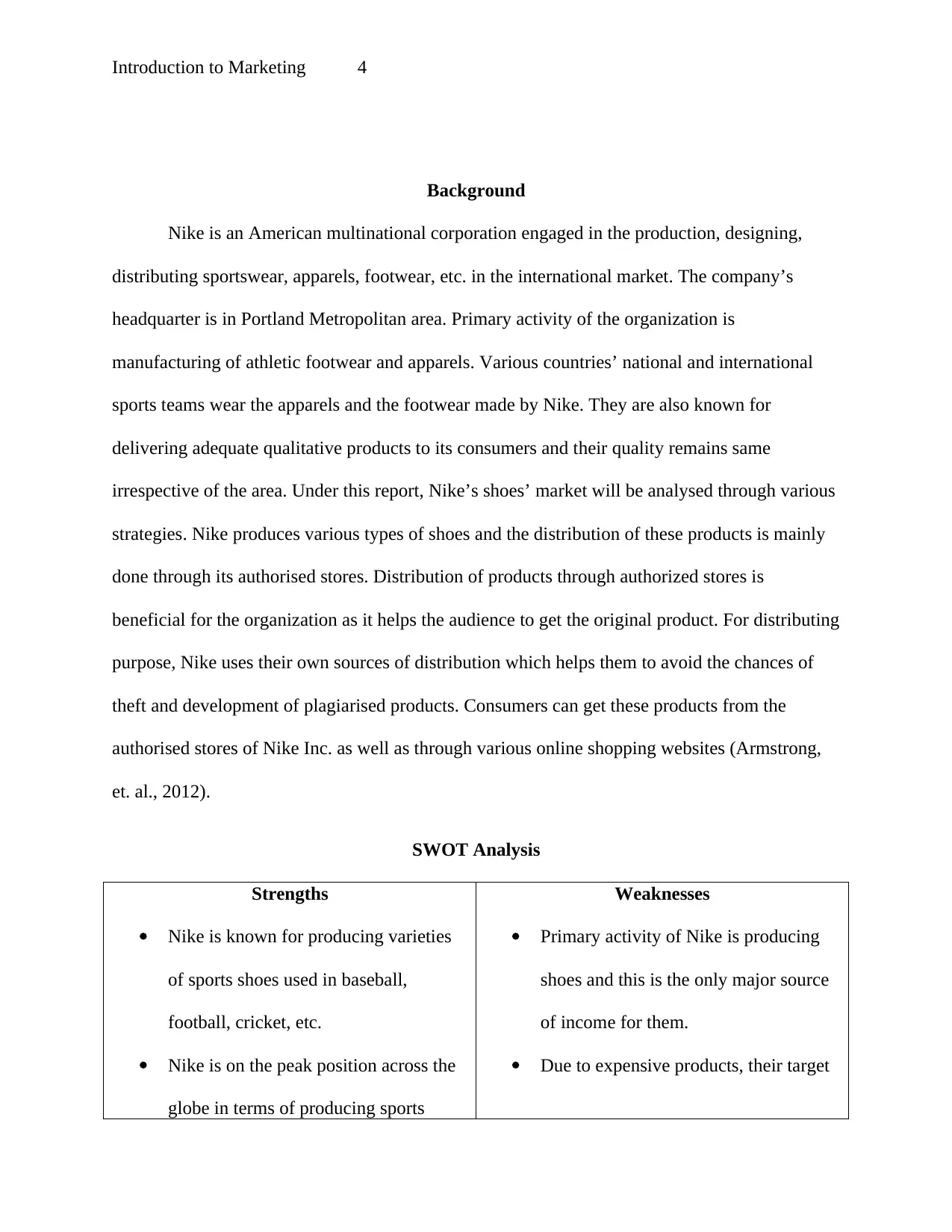
Introduction to Marketing 4
Background
Nike is an American multinational corporation engaged in the production, designing,
distributing sportswear, apparels, footwear, etc. in the international market. The company’s
headquarter is in Portland Metropolitan area. Primary activity of the organization is
manufacturing of athletic footwear and apparels. Various countries’ national and international
sports teams wear the apparels and the footwear made by Nike. They are also known for
delivering adequate qualitative products to its consumers and their quality remains same
irrespective of the area. Under this report, Nike’s shoes’ market will be analysed through various
strategies. Nike produces various types of shoes and the distribution of these products is mainly
done through its authorised stores. Distribution of products through authorized stores is
beneficial for the organization as it helps the audience to get the original product. For distributing
purpose, Nike uses their own sources of distribution which helps them to avoid the chances of
theft and development of plagiarised products. Consumers can get these products from the
authorised stores of Nike Inc. as well as through various online shopping websites (Armstrong,
et. al., 2012).
SWOT Analysis
Strengths
Nike is known for producing varieties
of sports shoes used in baseball,
football, cricket, etc.
Nike is on the peak position across the
globe in terms of producing sports
Weaknesses
Primary activity of Nike is producing
shoes and this is the only major source
of income for them.
Due to expensive products, their target
Background
Nike is an American multinational corporation engaged in the production, designing,
distributing sportswear, apparels, footwear, etc. in the international market. The company’s
headquarter is in Portland Metropolitan area. Primary activity of the organization is
manufacturing of athletic footwear and apparels. Various countries’ national and international
sports teams wear the apparels and the footwear made by Nike. They are also known for
delivering adequate qualitative products to its consumers and their quality remains same
irrespective of the area. Under this report, Nike’s shoes’ market will be analysed through various
strategies. Nike produces various types of shoes and the distribution of these products is mainly
done through its authorised stores. Distribution of products through authorized stores is
beneficial for the organization as it helps the audience to get the original product. For distributing
purpose, Nike uses their own sources of distribution which helps them to avoid the chances of
theft and development of plagiarised products. Consumers can get these products from the
authorised stores of Nike Inc. as well as through various online shopping websites (Armstrong,
et. al., 2012).
SWOT Analysis
Strengths
Nike is known for producing varieties
of sports shoes used in baseball,
football, cricket, etc.
Nike is on the peak position across the
globe in terms of producing sports
Weaknesses
Primary activity of Nike is producing
shoes and this is the only major source
of income for them.
Due to expensive products, their target
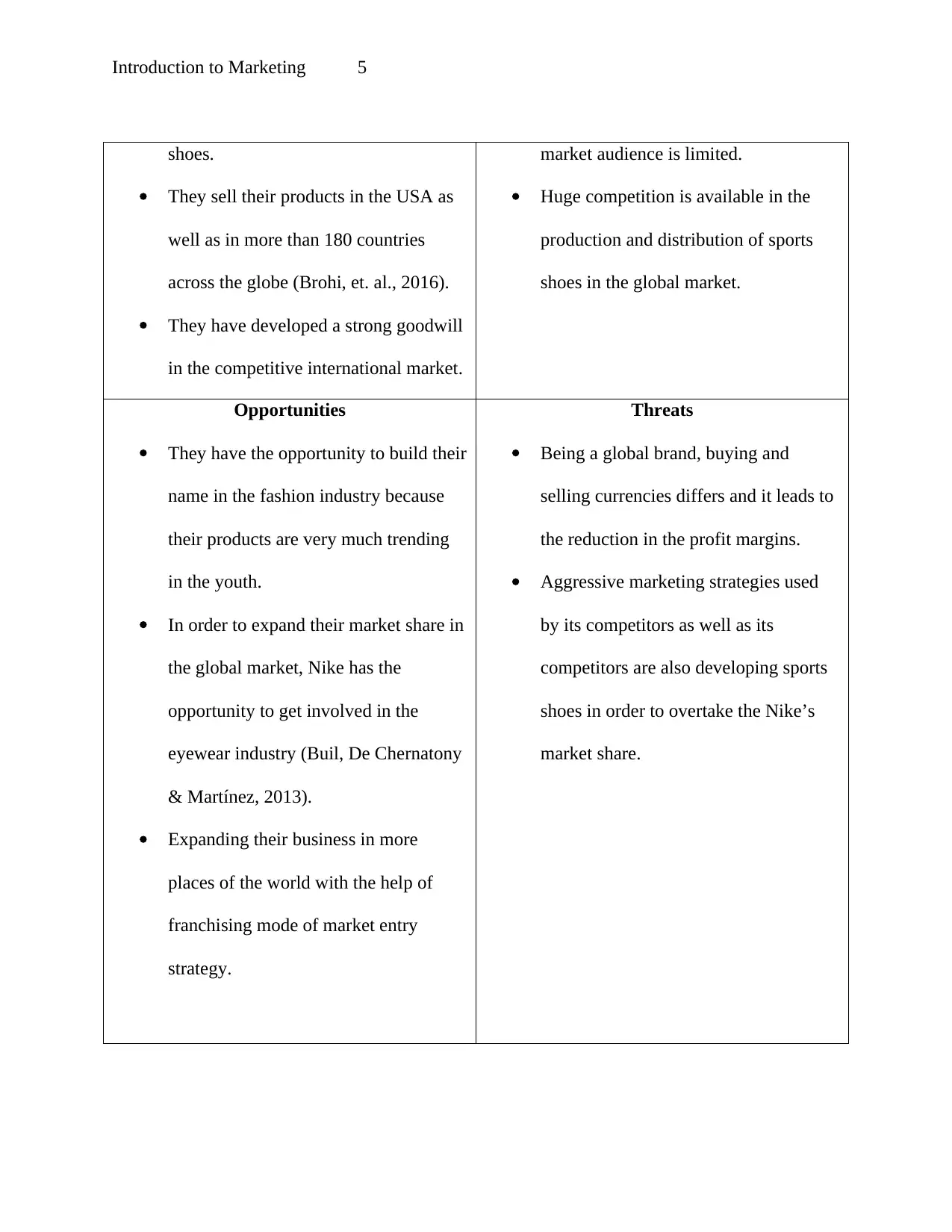
Introduction to Marketing 5
shoes.
They sell their products in the USA as
well as in more than 180 countries
across the globe (Brohi, et. al., 2016).
They have developed a strong goodwill
in the competitive international market.
market audience is limited.
Huge competition is available in the
production and distribution of sports
shoes in the global market.
Opportunities
They have the opportunity to build their
name in the fashion industry because
their products are very much trending
in the youth.
In order to expand their market share in
the global market, Nike has the
opportunity to get involved in the
eyewear industry (Buil, De Chernatony
& Martínez, 2013).
Expanding their business in more
places of the world with the help of
franchising mode of market entry
strategy.
Threats
Being a global brand, buying and
selling currencies differs and it leads to
the reduction in the profit margins.
Aggressive marketing strategies used
by its competitors as well as its
competitors are also developing sports
shoes in order to overtake the Nike’s
market share.
shoes.
They sell their products in the USA as
well as in more than 180 countries
across the globe (Brohi, et. al., 2016).
They have developed a strong goodwill
in the competitive international market.
market audience is limited.
Huge competition is available in the
production and distribution of sports
shoes in the global market.
Opportunities
They have the opportunity to build their
name in the fashion industry because
their products are very much trending
in the youth.
In order to expand their market share in
the global market, Nike has the
opportunity to get involved in the
eyewear industry (Buil, De Chernatony
& Martínez, 2013).
Expanding their business in more
places of the world with the help of
franchising mode of market entry
strategy.
Threats
Being a global brand, buying and
selling currencies differs and it leads to
the reduction in the profit margins.
Aggressive marketing strategies used
by its competitors as well as its
competitors are also developing sports
shoes in order to overtake the Nike’s
market share.
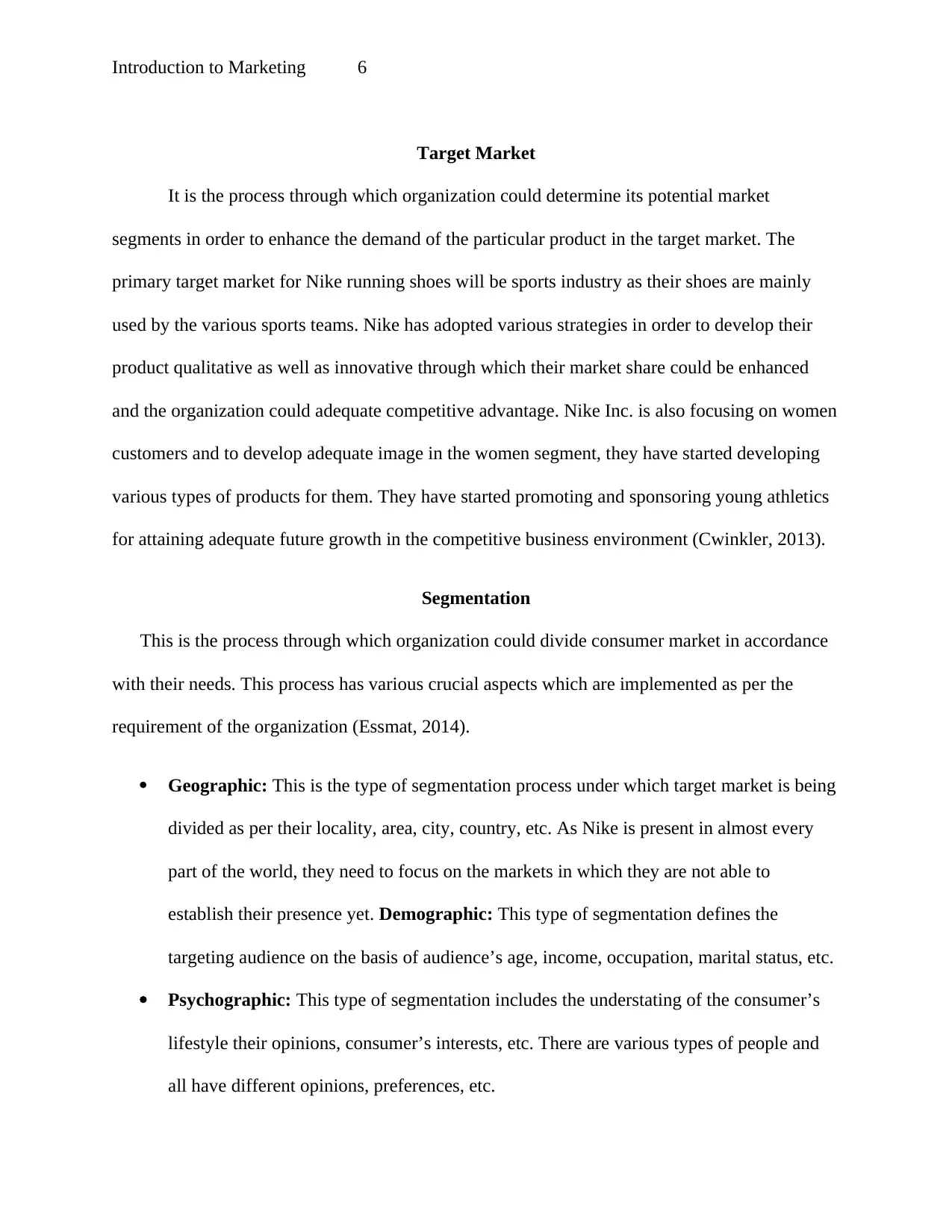
Introduction to Marketing 6
Target Market
It is the process through which organization could determine its potential market
segments in order to enhance the demand of the particular product in the target market. The
primary target market for Nike running shoes will be sports industry as their shoes are mainly
used by the various sports teams. Nike has adopted various strategies in order to develop their
product qualitative as well as innovative through which their market share could be enhanced
and the organization could adequate competitive advantage. Nike Inc. is also focusing on women
customers and to develop adequate image in the women segment, they have started developing
various types of products for them. They have started promoting and sponsoring young athletics
for attaining adequate future growth in the competitive business environment (Cwinkler, 2013).
Segmentation
This is the process through which organization could divide consumer market in accordance
with their needs. This process has various crucial aspects which are implemented as per the
requirement of the organization (Essmat, 2014).
Geographic: This is the type of segmentation process under which target market is being
divided as per their locality, area, city, country, etc. As Nike is present in almost every
part of the world, they need to focus on the markets in which they are not able to
establish their presence yet. Demographic: This type of segmentation defines the
targeting audience on the basis of audience’s age, income, occupation, marital status, etc.
Psychographic: This type of segmentation includes the understating of the consumer’s
lifestyle their opinions, consumer’s interests, etc. There are various types of people and
all have different opinions, preferences, etc.
Target Market
It is the process through which organization could determine its potential market
segments in order to enhance the demand of the particular product in the target market. The
primary target market for Nike running shoes will be sports industry as their shoes are mainly
used by the various sports teams. Nike has adopted various strategies in order to develop their
product qualitative as well as innovative through which their market share could be enhanced
and the organization could adequate competitive advantage. Nike Inc. is also focusing on women
customers and to develop adequate image in the women segment, they have started developing
various types of products for them. They have started promoting and sponsoring young athletics
for attaining adequate future growth in the competitive business environment (Cwinkler, 2013).
Segmentation
This is the process through which organization could divide consumer market in accordance
with their needs. This process has various crucial aspects which are implemented as per the
requirement of the organization (Essmat, 2014).
Geographic: This is the type of segmentation process under which target market is being
divided as per their locality, area, city, country, etc. As Nike is present in almost every
part of the world, they need to focus on the markets in which they are not able to
establish their presence yet. Demographic: This type of segmentation defines the
targeting audience on the basis of audience’s age, income, occupation, marital status, etc.
Psychographic: This type of segmentation includes the understating of the consumer’s
lifestyle their opinions, consumer’s interests, etc. There are various types of people and
all have different opinions, preferences, etc.
Paraphrase This Document
Need a fresh take? Get an instant paraphrase of this document with our AI Paraphraser
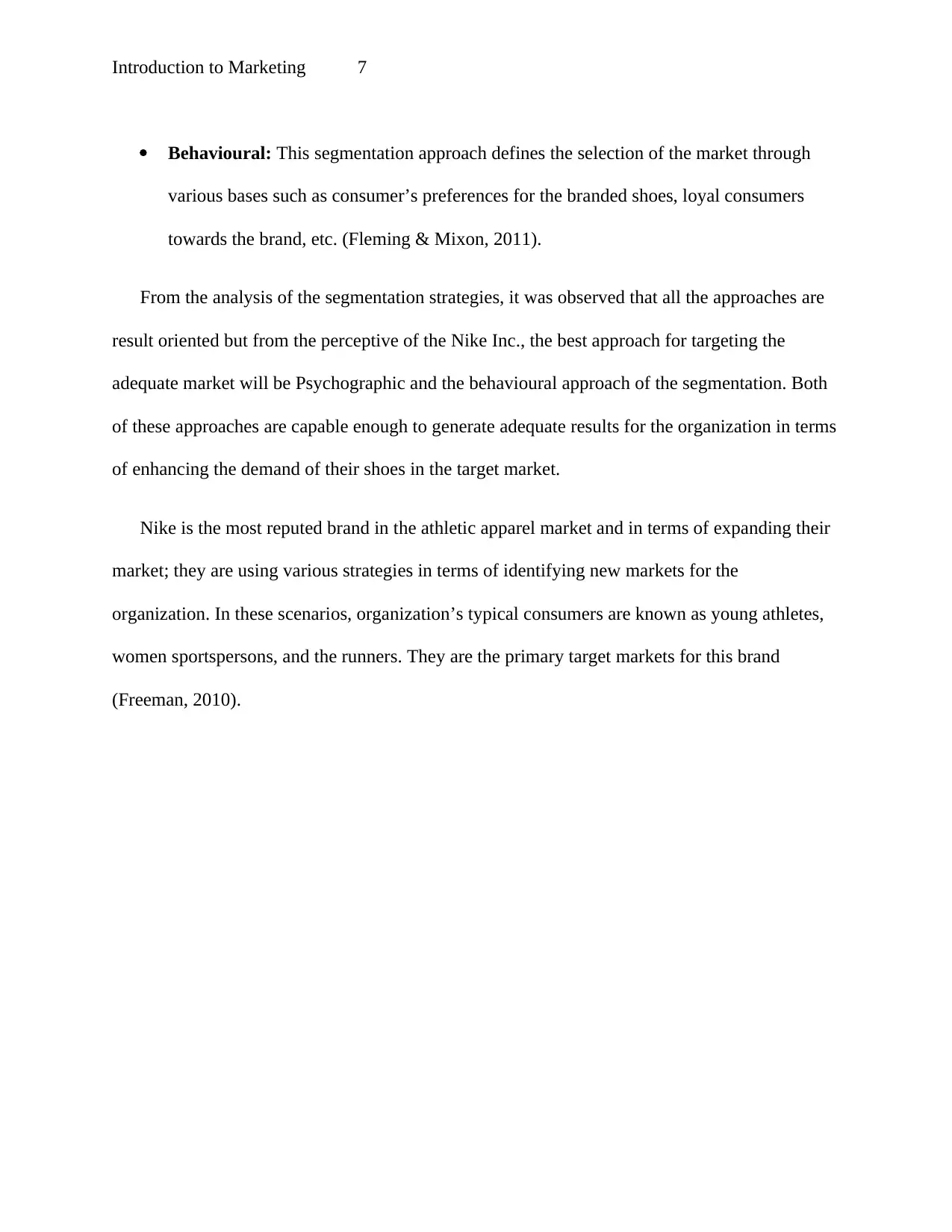
Introduction to Marketing 7
Behavioural: This segmentation approach defines the selection of the market through
various bases such as consumer’s preferences for the branded shoes, loyal consumers
towards the brand, etc. (Fleming & Mixon, 2011).
From the analysis of the segmentation strategies, it was observed that all the approaches are
result oriented but from the perceptive of the Nike Inc., the best approach for targeting the
adequate market will be Psychographic and the behavioural approach of the segmentation. Both
of these approaches are capable enough to generate adequate results for the organization in terms
of enhancing the demand of their shoes in the target market.
Nike is the most reputed brand in the athletic apparel market and in terms of expanding their
market; they are using various strategies in terms of identifying new markets for the
organization. In these scenarios, organization’s typical consumers are known as young athletes,
women sportspersons, and the runners. They are the primary target markets for this brand
(Freeman, 2010).
Behavioural: This segmentation approach defines the selection of the market through
various bases such as consumer’s preferences for the branded shoes, loyal consumers
towards the brand, etc. (Fleming & Mixon, 2011).
From the analysis of the segmentation strategies, it was observed that all the approaches are
result oriented but from the perceptive of the Nike Inc., the best approach for targeting the
adequate market will be Psychographic and the behavioural approach of the segmentation. Both
of these approaches are capable enough to generate adequate results for the organization in terms
of enhancing the demand of their shoes in the target market.
Nike is the most reputed brand in the athletic apparel market and in terms of expanding their
market; they are using various strategies in terms of identifying new markets for the
organization. In these scenarios, organization’s typical consumers are known as young athletes,
women sportspersons, and the runners. They are the primary target markets for this brand
(Freeman, 2010).
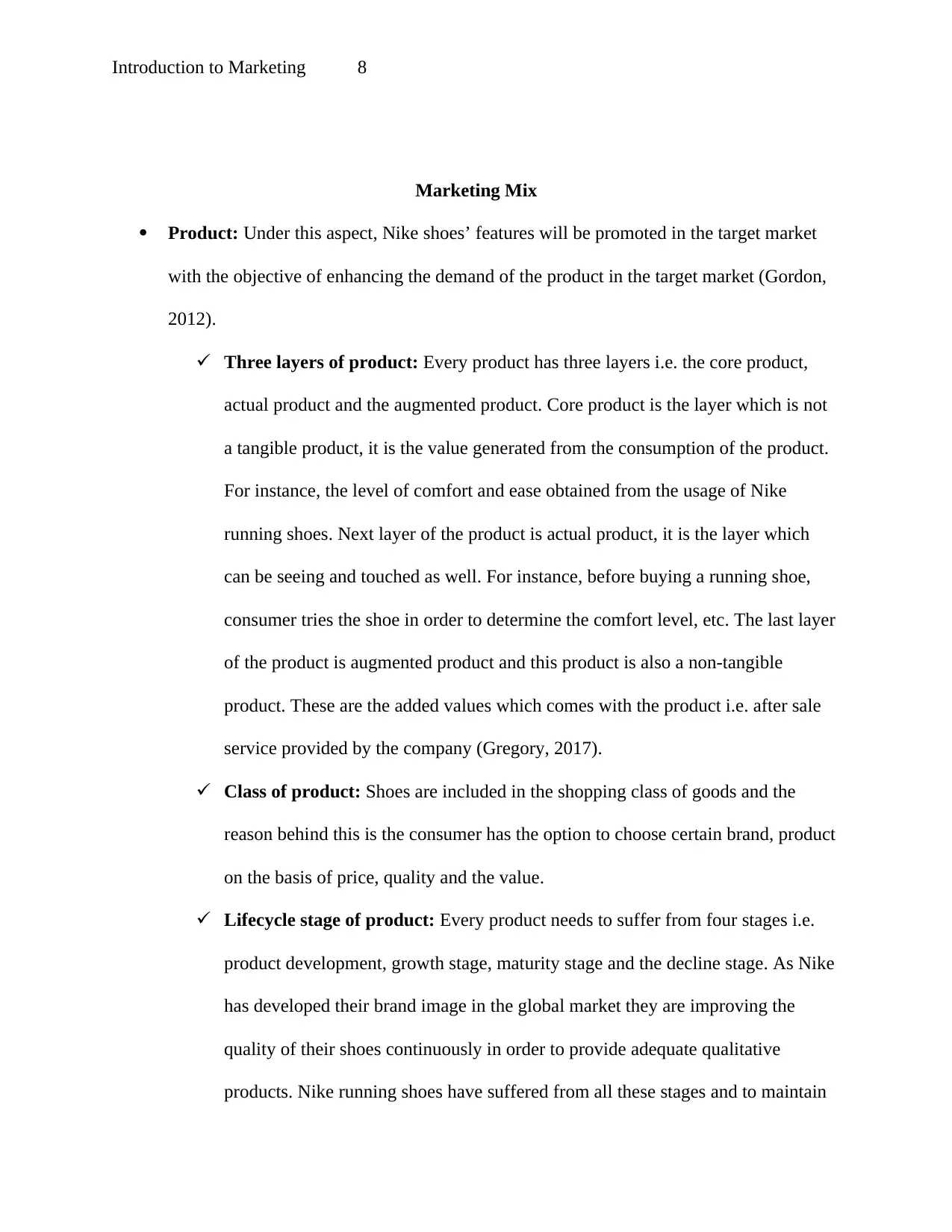
Introduction to Marketing 8
Marketing Mix
Product: Under this aspect, Nike shoes’ features will be promoted in the target market
with the objective of enhancing the demand of the product in the target market (Gordon,
2012).
Three layers of product: Every product has three layers i.e. the core product,
actual product and the augmented product. Core product is the layer which is not
a tangible product, it is the value generated from the consumption of the product.
For instance, the level of comfort and ease obtained from the usage of Nike
running shoes. Next layer of the product is actual product, it is the layer which
can be seeing and touched as well. For instance, before buying a running shoe,
consumer tries the shoe in order to determine the comfort level, etc. The last layer
of the product is augmented product and this product is also a non-tangible
product. These are the added values which comes with the product i.e. after sale
service provided by the company (Gregory, 2017).
Class of product: Shoes are included in the shopping class of goods and the
reason behind this is the consumer has the option to choose certain brand, product
on the basis of price, quality and the value.
Lifecycle stage of product: Every product needs to suffer from four stages i.e.
product development, growth stage, maturity stage and the decline stage. As Nike
has developed their brand image in the global market they are improving the
quality of their shoes continuously in order to provide adequate qualitative
products. Nike running shoes have suffered from all these stages and to maintain
Marketing Mix
Product: Under this aspect, Nike shoes’ features will be promoted in the target market
with the objective of enhancing the demand of the product in the target market (Gordon,
2012).
Three layers of product: Every product has three layers i.e. the core product,
actual product and the augmented product. Core product is the layer which is not
a tangible product, it is the value generated from the consumption of the product.
For instance, the level of comfort and ease obtained from the usage of Nike
running shoes. Next layer of the product is actual product, it is the layer which
can be seeing and touched as well. For instance, before buying a running shoe,
consumer tries the shoe in order to determine the comfort level, etc. The last layer
of the product is augmented product and this product is also a non-tangible
product. These are the added values which comes with the product i.e. after sale
service provided by the company (Gregory, 2017).
Class of product: Shoes are included in the shopping class of goods and the
reason behind this is the consumer has the option to choose certain brand, product
on the basis of price, quality and the value.
Lifecycle stage of product: Every product needs to suffer from four stages i.e.
product development, growth stage, maturity stage and the decline stage. As Nike
has developed their brand image in the global market they are improving the
quality of their shoes continuously in order to provide adequate qualitative
products. Nike running shoes have suffered from all these stages and to maintain
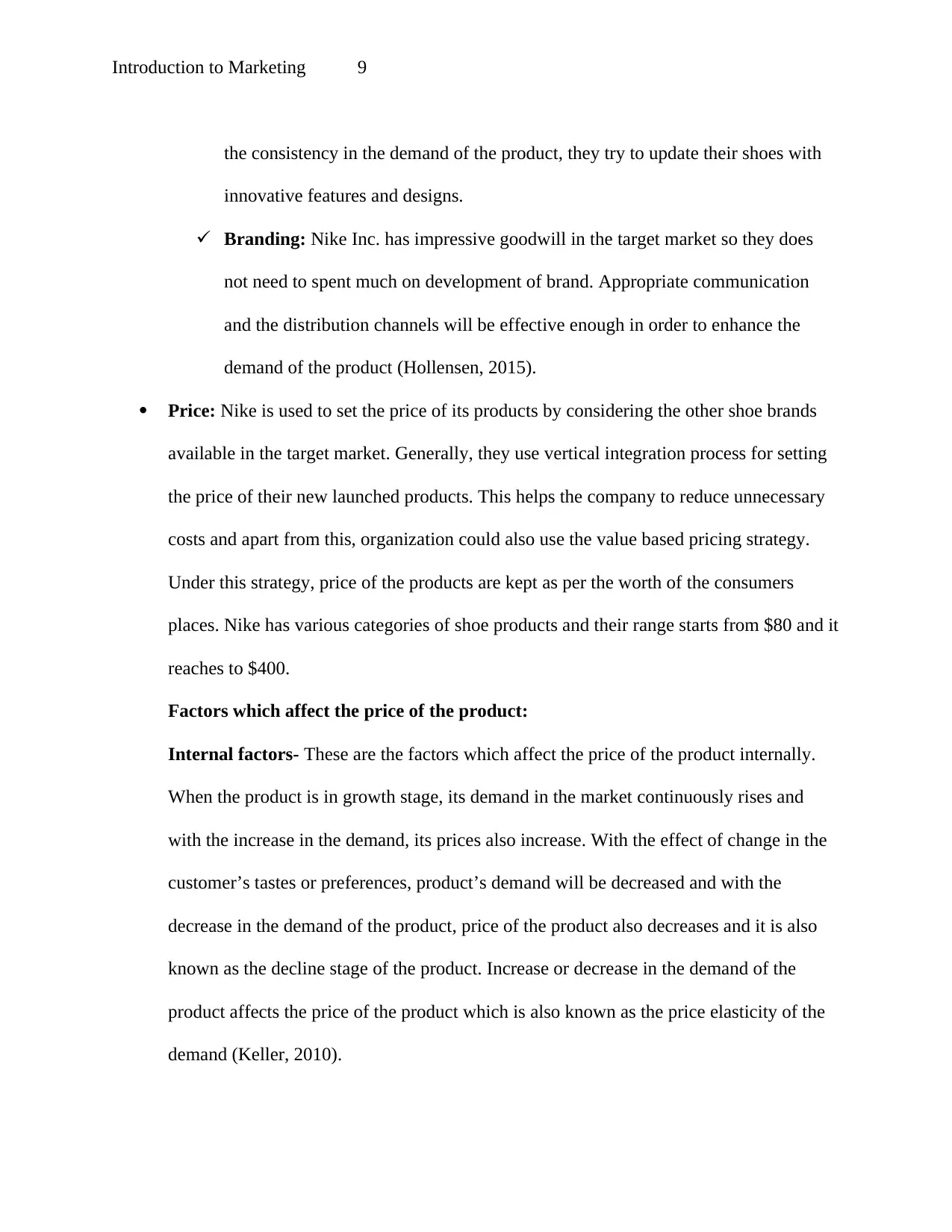
Introduction to Marketing 9
the consistency in the demand of the product, they try to update their shoes with
innovative features and designs.
Branding: Nike Inc. has impressive goodwill in the target market so they does
not need to spent much on development of brand. Appropriate communication
and the distribution channels will be effective enough in order to enhance the
demand of the product (Hollensen, 2015).
Price: Nike is used to set the price of its products by considering the other shoe brands
available in the target market. Generally, they use vertical integration process for setting
the price of their new launched products. This helps the company to reduce unnecessary
costs and apart from this, organization could also use the value based pricing strategy.
Under this strategy, price of the products are kept as per the worth of the consumers
places. Nike has various categories of shoe products and their range starts from $80 and it
reaches to $400.
Factors which affect the price of the product:
Internal factors- These are the factors which affect the price of the product internally.
When the product is in growth stage, its demand in the market continuously rises and
with the increase in the demand, its prices also increase. With the effect of change in the
customer’s tastes or preferences, product’s demand will be decreased and with the
decrease in the demand of the product, price of the product also decreases and it is also
known as the decline stage of the product. Increase or decrease in the demand of the
product affects the price of the product which is also known as the price elasticity of the
demand (Keller, 2010).
the consistency in the demand of the product, they try to update their shoes with
innovative features and designs.
Branding: Nike Inc. has impressive goodwill in the target market so they does
not need to spent much on development of brand. Appropriate communication
and the distribution channels will be effective enough in order to enhance the
demand of the product (Hollensen, 2015).
Price: Nike is used to set the price of its products by considering the other shoe brands
available in the target market. Generally, they use vertical integration process for setting
the price of their new launched products. This helps the company to reduce unnecessary
costs and apart from this, organization could also use the value based pricing strategy.
Under this strategy, price of the products are kept as per the worth of the consumers
places. Nike has various categories of shoe products and their range starts from $80 and it
reaches to $400.
Factors which affect the price of the product:
Internal factors- These are the factors which affect the price of the product internally.
When the product is in growth stage, its demand in the market continuously rises and
with the increase in the demand, its prices also increase. With the effect of change in the
customer’s tastes or preferences, product’s demand will be decreased and with the
decrease in the demand of the product, price of the product also decreases and it is also
known as the decline stage of the product. Increase or decrease in the demand of the
product affects the price of the product which is also known as the price elasticity of the
demand (Keller, 2010).
Secure Best Marks with AI Grader
Need help grading? Try our AI Grader for instant feedback on your assignments.
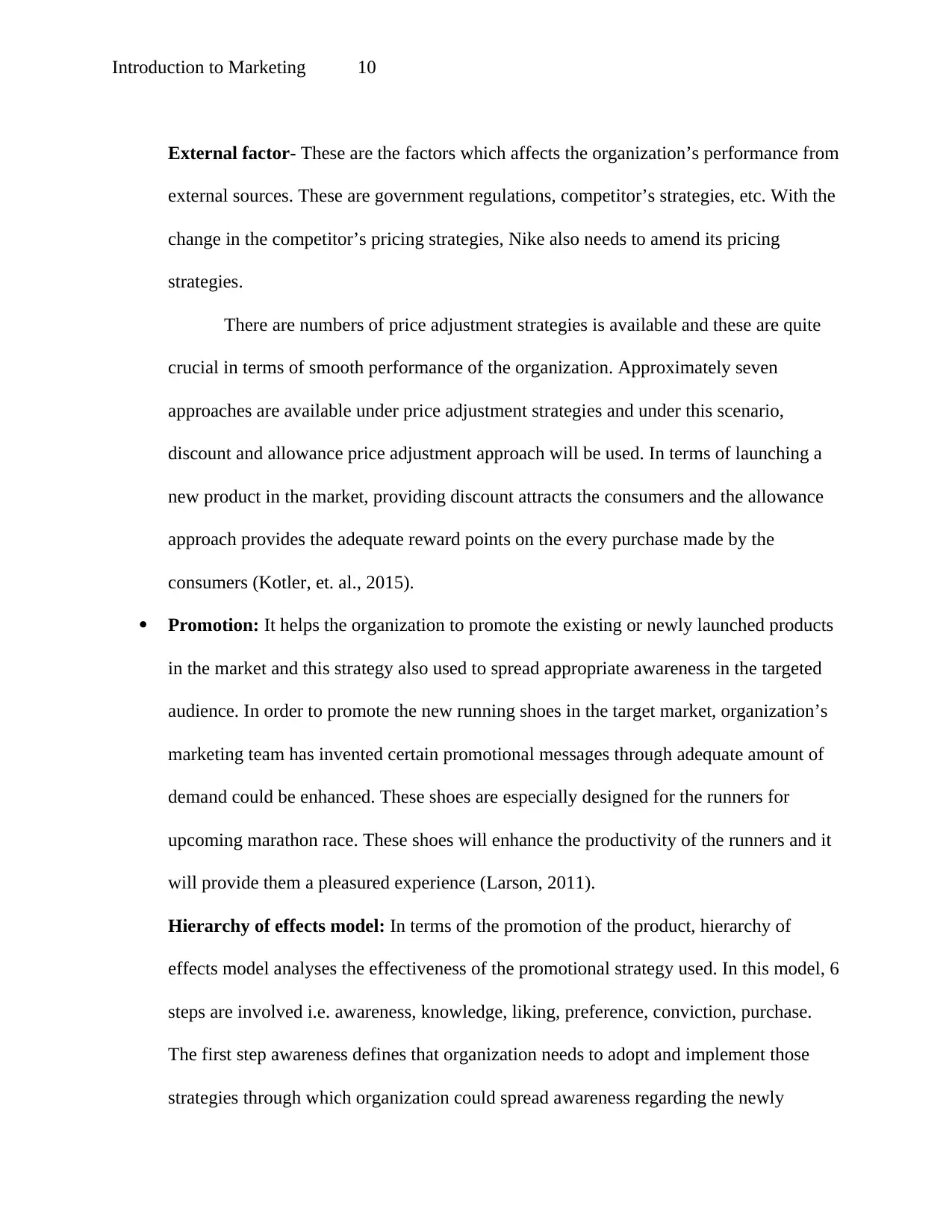
Introduction to Marketing 10
External factor- These are the factors which affects the organization’s performance from
external sources. These are government regulations, competitor’s strategies, etc. With the
change in the competitor’s pricing strategies, Nike also needs to amend its pricing
strategies.
There are numbers of price adjustment strategies is available and these are quite
crucial in terms of smooth performance of the organization. Approximately seven
approaches are available under price adjustment strategies and under this scenario,
discount and allowance price adjustment approach will be used. In terms of launching a
new product in the market, providing discount attracts the consumers and the allowance
approach provides the adequate reward points on the every purchase made by the
consumers (Kotler, et. al., 2015).
Promotion: It helps the organization to promote the existing or newly launched products
in the market and this strategy also used to spread appropriate awareness in the targeted
audience. In order to promote the new running shoes in the target market, organization’s
marketing team has invented certain promotional messages through adequate amount of
demand could be enhanced. These shoes are especially designed for the runners for
upcoming marathon race. These shoes will enhance the productivity of the runners and it
will provide them a pleasured experience (Larson, 2011).
Hierarchy of effects model: In terms of the promotion of the product, hierarchy of
effects model analyses the effectiveness of the promotional strategy used. In this model, 6
steps are involved i.e. awareness, knowledge, liking, preference, conviction, purchase.
The first step awareness defines that organization needs to adopt and implement those
strategies through which organization could spread awareness regarding the newly
External factor- These are the factors which affects the organization’s performance from
external sources. These are government regulations, competitor’s strategies, etc. With the
change in the competitor’s pricing strategies, Nike also needs to amend its pricing
strategies.
There are numbers of price adjustment strategies is available and these are quite
crucial in terms of smooth performance of the organization. Approximately seven
approaches are available under price adjustment strategies and under this scenario,
discount and allowance price adjustment approach will be used. In terms of launching a
new product in the market, providing discount attracts the consumers and the allowance
approach provides the adequate reward points on the every purchase made by the
consumers (Kotler, et. al., 2015).
Promotion: It helps the organization to promote the existing or newly launched products
in the market and this strategy also used to spread appropriate awareness in the targeted
audience. In order to promote the new running shoes in the target market, organization’s
marketing team has invented certain promotional messages through adequate amount of
demand could be enhanced. These shoes are especially designed for the runners for
upcoming marathon race. These shoes will enhance the productivity of the runners and it
will provide them a pleasured experience (Larson, 2011).
Hierarchy of effects model: In terms of the promotion of the product, hierarchy of
effects model analyses the effectiveness of the promotional strategy used. In this model, 6
steps are involved i.e. awareness, knowledge, liking, preference, conviction, purchase.
The first step awareness defines that organization needs to adopt and implement those
strategies through which organization could spread awareness regarding the newly
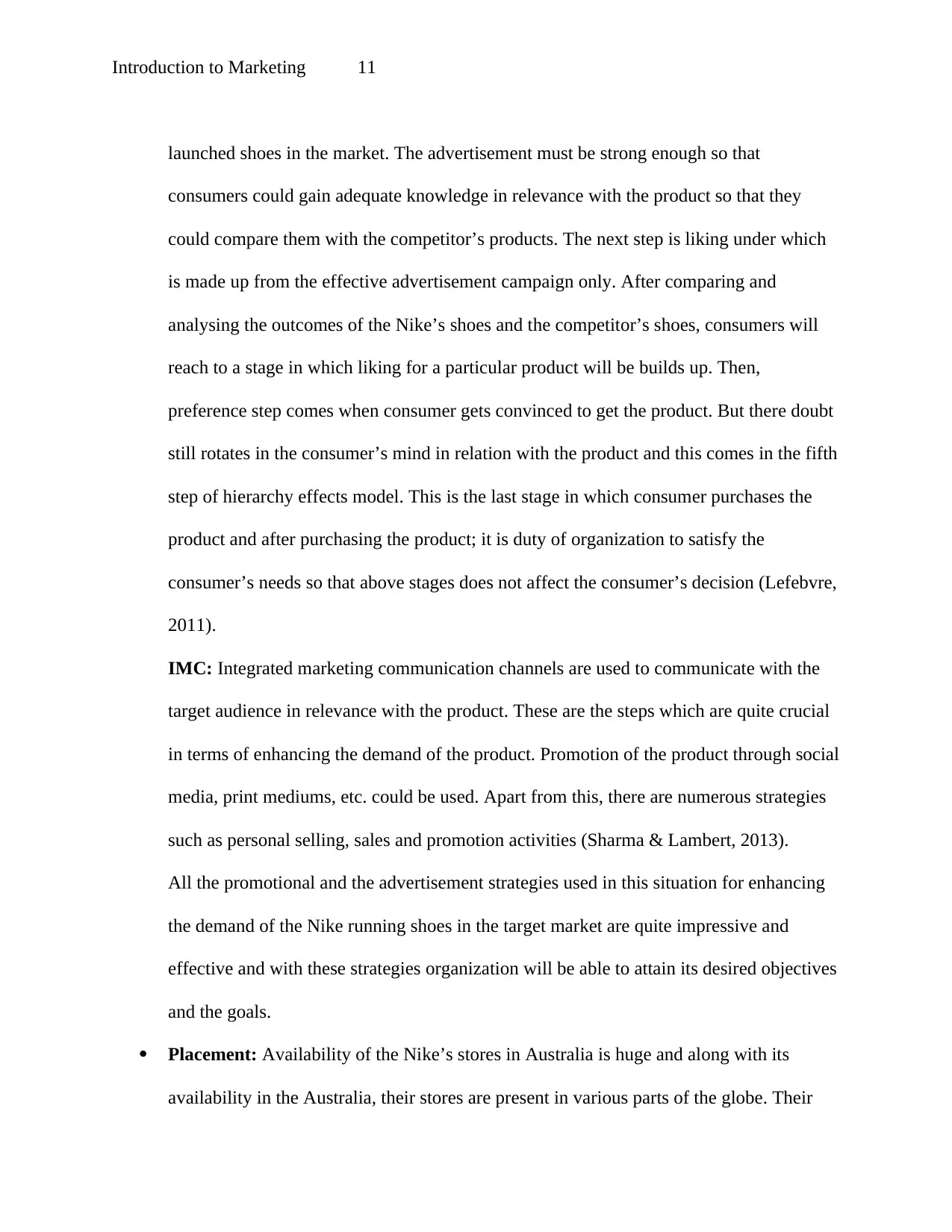
Introduction to Marketing 11
launched shoes in the market. The advertisement must be strong enough so that
consumers could gain adequate knowledge in relevance with the product so that they
could compare them with the competitor’s products. The next step is liking under which
is made up from the effective advertisement campaign only. After comparing and
analysing the outcomes of the Nike’s shoes and the competitor’s shoes, consumers will
reach to a stage in which liking for a particular product will be builds up. Then,
preference step comes when consumer gets convinced to get the product. But there doubt
still rotates in the consumer’s mind in relation with the product and this comes in the fifth
step of hierarchy effects model. This is the last stage in which consumer purchases the
product and after purchasing the product; it is duty of organization to satisfy the
consumer’s needs so that above stages does not affect the consumer’s decision (Lefebvre,
2011).
IMC: Integrated marketing communication channels are used to communicate with the
target audience in relevance with the product. These are the steps which are quite crucial
in terms of enhancing the demand of the product. Promotion of the product through social
media, print mediums, etc. could be used. Apart from this, there are numerous strategies
such as personal selling, sales and promotion activities (Sharma & Lambert, 2013).
All the promotional and the advertisement strategies used in this situation for enhancing
the demand of the Nike running shoes in the target market are quite impressive and
effective and with these strategies organization will be able to attain its desired objectives
and the goals.
Placement: Availability of the Nike’s stores in Australia is huge and along with its
availability in the Australia, their stores are present in various parts of the globe. Their
launched shoes in the market. The advertisement must be strong enough so that
consumers could gain adequate knowledge in relevance with the product so that they
could compare them with the competitor’s products. The next step is liking under which
is made up from the effective advertisement campaign only. After comparing and
analysing the outcomes of the Nike’s shoes and the competitor’s shoes, consumers will
reach to a stage in which liking for a particular product will be builds up. Then,
preference step comes when consumer gets convinced to get the product. But there doubt
still rotates in the consumer’s mind in relation with the product and this comes in the fifth
step of hierarchy effects model. This is the last stage in which consumer purchases the
product and after purchasing the product; it is duty of organization to satisfy the
consumer’s needs so that above stages does not affect the consumer’s decision (Lefebvre,
2011).
IMC: Integrated marketing communication channels are used to communicate with the
target audience in relevance with the product. These are the steps which are quite crucial
in terms of enhancing the demand of the product. Promotion of the product through social
media, print mediums, etc. could be used. Apart from this, there are numerous strategies
such as personal selling, sales and promotion activities (Sharma & Lambert, 2013).
All the promotional and the advertisement strategies used in this situation for enhancing
the demand of the Nike running shoes in the target market are quite impressive and
effective and with these strategies organization will be able to attain its desired objectives
and the goals.
Placement: Availability of the Nike’s stores in Australia is huge and along with its
availability in the Australia, their stores are present in various parts of the globe. Their
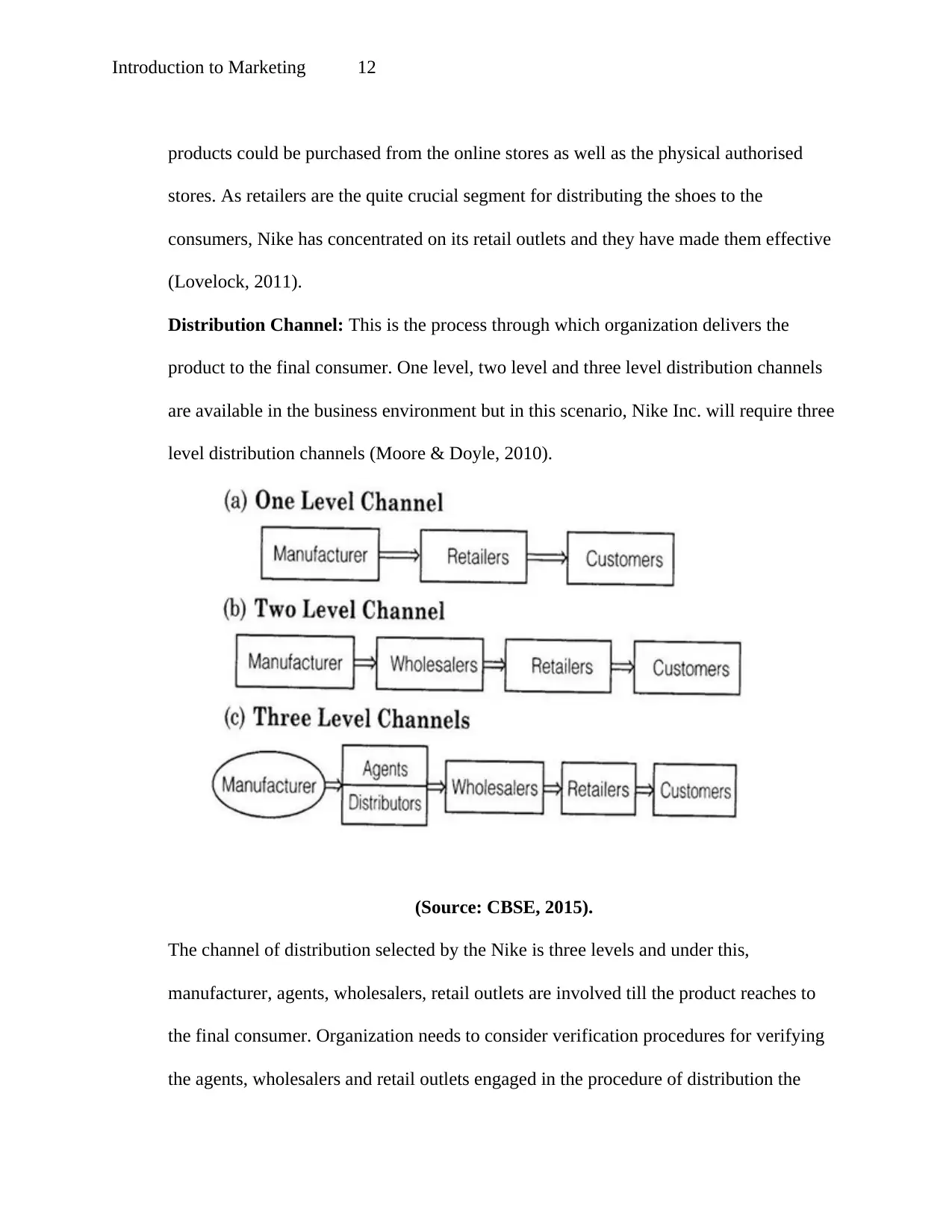
Introduction to Marketing 12
products could be purchased from the online stores as well as the physical authorised
stores. As retailers are the quite crucial segment for distributing the shoes to the
consumers, Nike has concentrated on its retail outlets and they have made them effective
(Lovelock, 2011).
Distribution Channel: This is the process through which organization delivers the
product to the final consumer. One level, two level and three level distribution channels
are available in the business environment but in this scenario, Nike Inc. will require three
level distribution channels (Moore & Doyle, 2010).
(Source: CBSE, 2015).
The channel of distribution selected by the Nike is three levels and under this,
manufacturer, agents, wholesalers, retail outlets are involved till the product reaches to
the final consumer. Organization needs to consider verification procedures for verifying
the agents, wholesalers and retail outlets engaged in the procedure of distribution the
products could be purchased from the online stores as well as the physical authorised
stores. As retailers are the quite crucial segment for distributing the shoes to the
consumers, Nike has concentrated on its retail outlets and they have made them effective
(Lovelock, 2011).
Distribution Channel: This is the process through which organization delivers the
product to the final consumer. One level, two level and three level distribution channels
are available in the business environment but in this scenario, Nike Inc. will require three
level distribution channels (Moore & Doyle, 2010).
(Source: CBSE, 2015).
The channel of distribution selected by the Nike is three levels and under this,
manufacturer, agents, wholesalers, retail outlets are involved till the product reaches to
the final consumer. Organization needs to consider verification procedures for verifying
the agents, wholesalers and retail outlets engaged in the procedure of distribution the
Paraphrase This Document
Need a fresh take? Get an instant paraphrase of this document with our AI Paraphraser
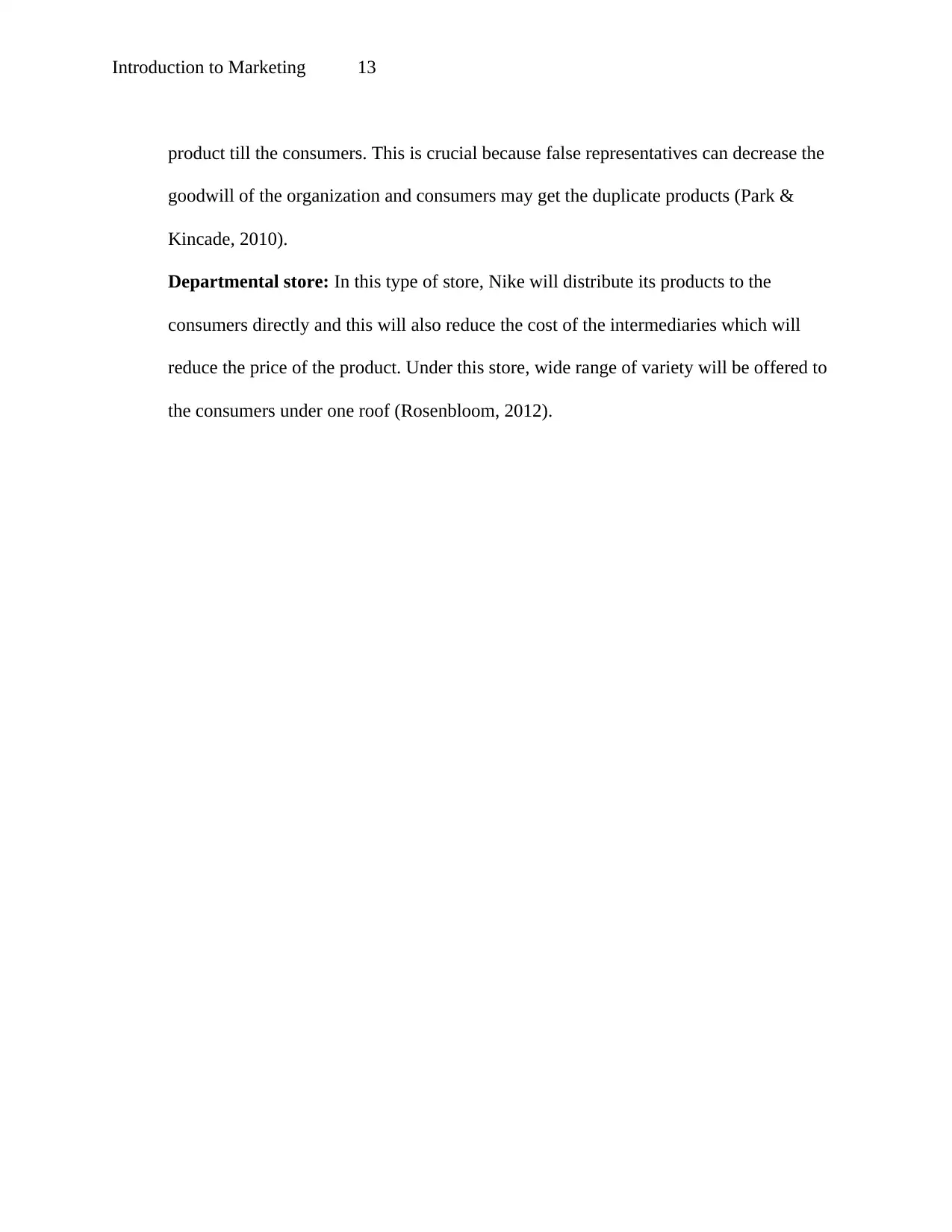
Introduction to Marketing 13
product till the consumers. This is crucial because false representatives can decrease the
goodwill of the organization and consumers may get the duplicate products (Park &
Kincade, 2010).
Departmental store: In this type of store, Nike will distribute its products to the
consumers directly and this will also reduce the cost of the intermediaries which will
reduce the price of the product. Under this store, wide range of variety will be offered to
the consumers under one roof (Rosenbloom, 2012).
product till the consumers. This is crucial because false representatives can decrease the
goodwill of the organization and consumers may get the duplicate products (Park &
Kincade, 2010).
Departmental store: In this type of store, Nike will distribute its products to the
consumers directly and this will also reduce the cost of the intermediaries which will
reduce the price of the product. Under this store, wide range of variety will be offered to
the consumers under one roof (Rosenbloom, 2012).
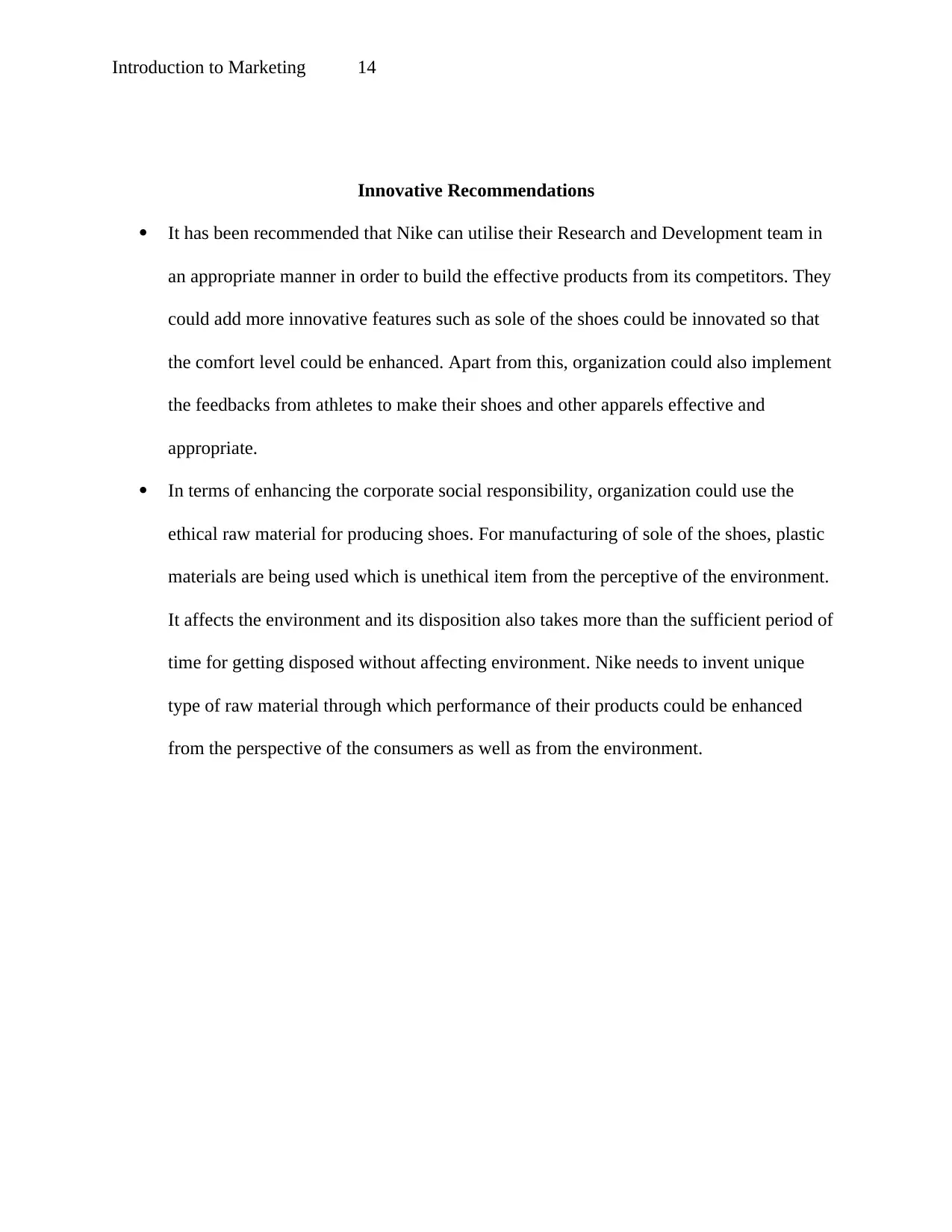
Introduction to Marketing 14
Innovative Recommendations
It has been recommended that Nike can utilise their Research and Development team in
an appropriate manner in order to build the effective products from its competitors. They
could add more innovative features such as sole of the shoes could be innovated so that
the comfort level could be enhanced. Apart from this, organization could also implement
the feedbacks from athletes to make their shoes and other apparels effective and
appropriate.
In terms of enhancing the corporate social responsibility, organization could use the
ethical raw material for producing shoes. For manufacturing of sole of the shoes, plastic
materials are being used which is unethical item from the perceptive of the environment.
It affects the environment and its disposition also takes more than the sufficient period of
time for getting disposed without affecting environment. Nike needs to invent unique
type of raw material through which performance of their products could be enhanced
from the perspective of the consumers as well as from the environment.
Innovative Recommendations
It has been recommended that Nike can utilise their Research and Development team in
an appropriate manner in order to build the effective products from its competitors. They
could add more innovative features such as sole of the shoes could be innovated so that
the comfort level could be enhanced. Apart from this, organization could also implement
the feedbacks from athletes to make their shoes and other apparels effective and
appropriate.
In terms of enhancing the corporate social responsibility, organization could use the
ethical raw material for producing shoes. For manufacturing of sole of the shoes, plastic
materials are being used which is unethical item from the perceptive of the environment.
It affects the environment and its disposition also takes more than the sufficient period of
time for getting disposed without affecting environment. Nike needs to invent unique
type of raw material through which performance of their products could be enhanced
from the perspective of the consumers as well as from the environment.
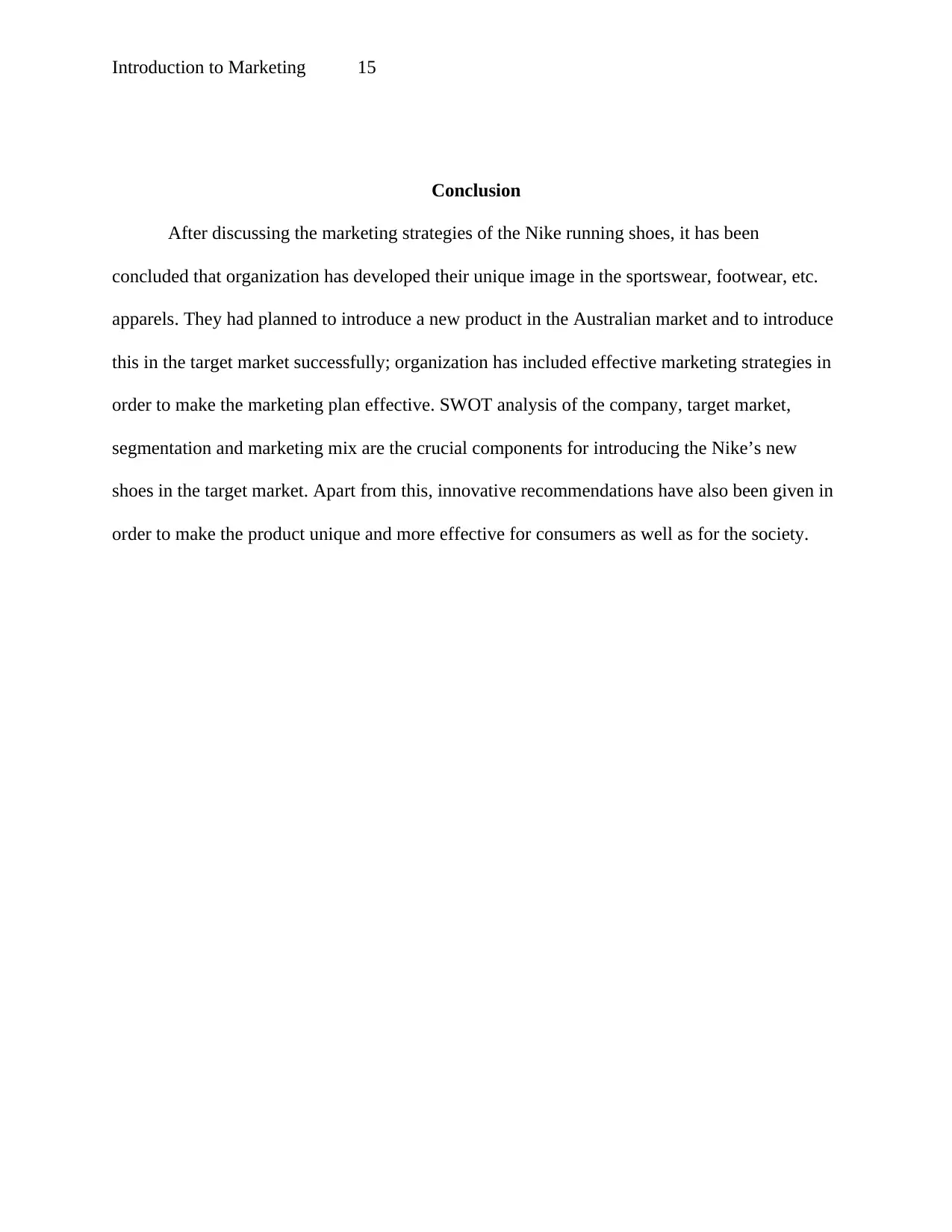
Introduction to Marketing 15
Conclusion
After discussing the marketing strategies of the Nike running shoes, it has been
concluded that organization has developed their unique image in the sportswear, footwear, etc.
apparels. They had planned to introduce a new product in the Australian market and to introduce
this in the target market successfully; organization has included effective marketing strategies in
order to make the marketing plan effective. SWOT analysis of the company, target market,
segmentation and marketing mix are the crucial components for introducing the Nike’s new
shoes in the target market. Apart from this, innovative recommendations have also been given in
order to make the product unique and more effective for consumers as well as for the society.
Conclusion
After discussing the marketing strategies of the Nike running shoes, it has been
concluded that organization has developed their unique image in the sportswear, footwear, etc.
apparels. They had planned to introduce a new product in the Australian market and to introduce
this in the target market successfully; organization has included effective marketing strategies in
order to make the marketing plan effective. SWOT analysis of the company, target market,
segmentation and marketing mix are the crucial components for introducing the Nike’s new
shoes in the target market. Apart from this, innovative recommendations have also been given in
order to make the product unique and more effective for consumers as well as for the society.
Secure Best Marks with AI Grader
Need help grading? Try our AI Grader for instant feedback on your assignments.
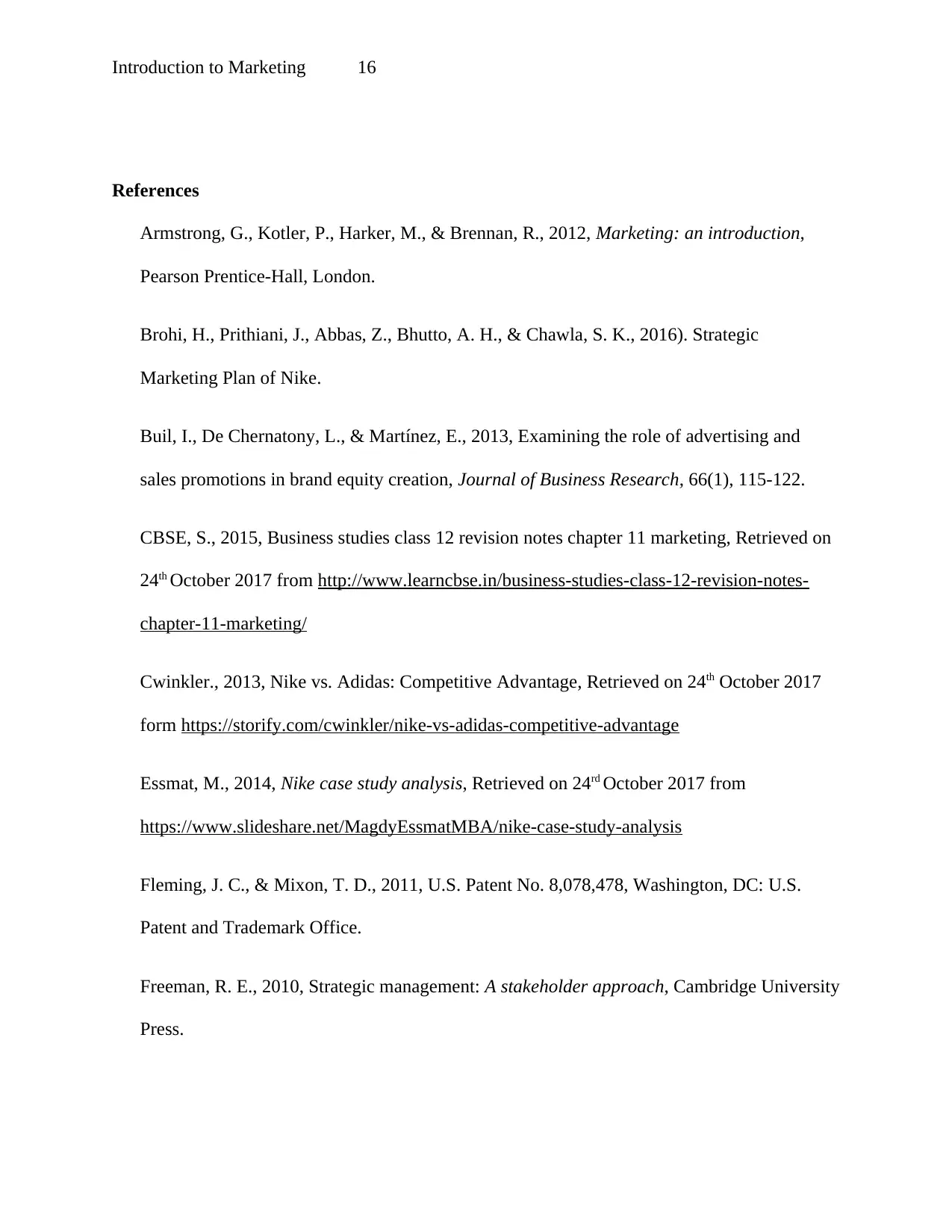
Introduction to Marketing 16
References
Armstrong, G., Kotler, P., Harker, M., & Brennan, R., 2012, Marketing: an introduction,
Pearson Prentice-Hall, London.
Brohi, H., Prithiani, J., Abbas, Z., Bhutto, A. H., & Chawla, S. K., 2016). Strategic
Marketing Plan of Nike.
Buil, I., De Chernatony, L., & Martínez, E., 2013, Examining the role of advertising and
sales promotions in brand equity creation, Journal of Business Research, 66(1), 115-122.
CBSE, S., 2015, Business studies class 12 revision notes chapter 11 marketing, Retrieved on
24th October 2017 from http://www.learncbse.in/business-studies-class-12-revision-notes-
chapter-11-marketing/
Cwinkler., 2013, Nike vs. Adidas: Competitive Advantage, Retrieved on 24th October 2017
form https://storify.com/cwinkler/nike-vs-adidas-competitive-advantage
Essmat, M., 2014, Nike case study analysis, Retrieved on 24rd October 2017 from
https://www.slideshare.net/MagdyEssmatMBA/nike-case-study-analysis
Fleming, J. C., & Mixon, T. D., 2011, U.S. Patent No. 8,078,478, Washington, DC: U.S.
Patent and Trademark Office.
Freeman, R. E., 2010, Strategic management: A stakeholder approach, Cambridge University
Press.
References
Armstrong, G., Kotler, P., Harker, M., & Brennan, R., 2012, Marketing: an introduction,
Pearson Prentice-Hall, London.
Brohi, H., Prithiani, J., Abbas, Z., Bhutto, A. H., & Chawla, S. K., 2016). Strategic
Marketing Plan of Nike.
Buil, I., De Chernatony, L., & Martínez, E., 2013, Examining the role of advertising and
sales promotions in brand equity creation, Journal of Business Research, 66(1), 115-122.
CBSE, S., 2015, Business studies class 12 revision notes chapter 11 marketing, Retrieved on
24th October 2017 from http://www.learncbse.in/business-studies-class-12-revision-notes-
chapter-11-marketing/
Cwinkler., 2013, Nike vs. Adidas: Competitive Advantage, Retrieved on 24th October 2017
form https://storify.com/cwinkler/nike-vs-adidas-competitive-advantage
Essmat, M., 2014, Nike case study analysis, Retrieved on 24rd October 2017 from
https://www.slideshare.net/MagdyEssmatMBA/nike-case-study-analysis
Fleming, J. C., & Mixon, T. D., 2011, U.S. Patent No. 8,078,478, Washington, DC: U.S.
Patent and Trademark Office.
Freeman, R. E., 2010, Strategic management: A stakeholder approach, Cambridge University
Press.
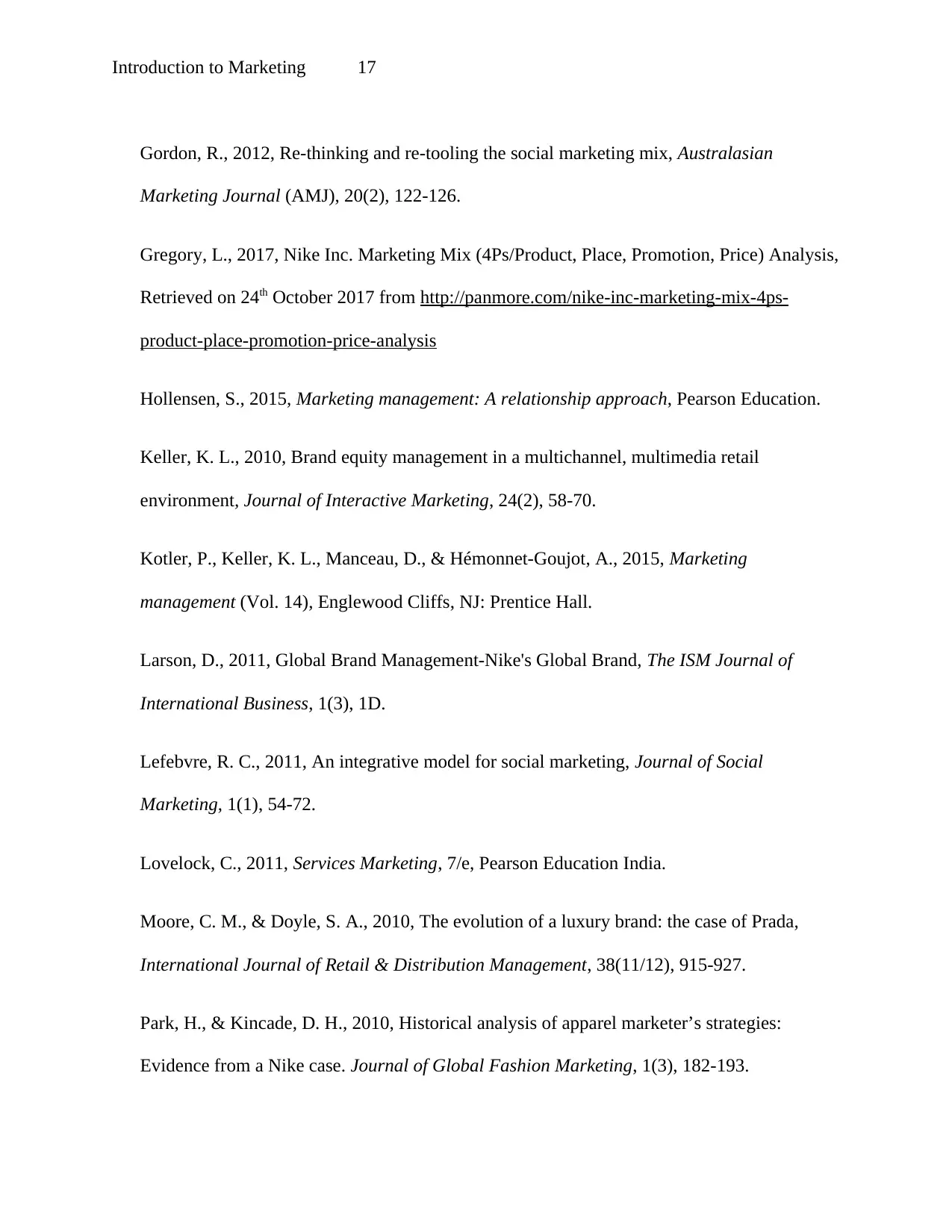
Introduction to Marketing 17
Gordon, R., 2012, Re-thinking and re-tooling the social marketing mix, Australasian
Marketing Journal (AMJ), 20(2), 122-126.
Gregory, L., 2017, Nike Inc. Marketing Mix (4Ps/Product, Place, Promotion, Price) Analysis,
Retrieved on 24th October 2017 from http://panmore.com/nike-inc-marketing-mix-4ps-
product-place-promotion-price-analysis
Hollensen, S., 2015, Marketing management: A relationship approach, Pearson Education.
Keller, K. L., 2010, Brand equity management in a multichannel, multimedia retail
environment, Journal of Interactive Marketing, 24(2), 58-70.
Kotler, P., Keller, K. L., Manceau, D., & Hémonnet-Goujot, A., 2015, Marketing
management (Vol. 14), Englewood Cliffs, NJ: Prentice Hall.
Larson, D., 2011, Global Brand Management-Nike's Global Brand, The ISM Journal of
International Business, 1(3), 1D.
Lefebvre, R. C., 2011, An integrative model for social marketing, Journal of Social
Marketing, 1(1), 54-72.
Lovelock, C., 2011, Services Marketing, 7/e, Pearson Education India.
Moore, C. M., & Doyle, S. A., 2010, The evolution of a luxury brand: the case of Prada,
International Journal of Retail & Distribution Management, 38(11/12), 915-927.
Park, H., & Kincade, D. H., 2010, Historical analysis of apparel marketer’s strategies:
Evidence from a Nike case. Journal of Global Fashion Marketing, 1(3), 182-193.
Gordon, R., 2012, Re-thinking and re-tooling the social marketing mix, Australasian
Marketing Journal (AMJ), 20(2), 122-126.
Gregory, L., 2017, Nike Inc. Marketing Mix (4Ps/Product, Place, Promotion, Price) Analysis,
Retrieved on 24th October 2017 from http://panmore.com/nike-inc-marketing-mix-4ps-
product-place-promotion-price-analysis
Hollensen, S., 2015, Marketing management: A relationship approach, Pearson Education.
Keller, K. L., 2010, Brand equity management in a multichannel, multimedia retail
environment, Journal of Interactive Marketing, 24(2), 58-70.
Kotler, P., Keller, K. L., Manceau, D., & Hémonnet-Goujot, A., 2015, Marketing
management (Vol. 14), Englewood Cliffs, NJ: Prentice Hall.
Larson, D., 2011, Global Brand Management-Nike's Global Brand, The ISM Journal of
International Business, 1(3), 1D.
Lefebvre, R. C., 2011, An integrative model for social marketing, Journal of Social
Marketing, 1(1), 54-72.
Lovelock, C., 2011, Services Marketing, 7/e, Pearson Education India.
Moore, C. M., & Doyle, S. A., 2010, The evolution of a luxury brand: the case of Prada,
International Journal of Retail & Distribution Management, 38(11/12), 915-927.
Park, H., & Kincade, D. H., 2010, Historical analysis of apparel marketer’s strategies:
Evidence from a Nike case. Journal of Global Fashion Marketing, 1(3), 182-193.

Introduction to Marketing 18
Rosenbloom, B., 2012, Marketing channels, Cengage Learning.
Sharma, A., & Lambert, D. M., 2013, Segmentation of markets based on customer service,
International Journal of Physical Distribution & Logistics Management.
Rosenbloom, B., 2012, Marketing channels, Cengage Learning.
Sharma, A., & Lambert, D. M., 2013, Segmentation of markets based on customer service,
International Journal of Physical Distribution & Logistics Management.
Paraphrase This Document
Need a fresh take? Get an instant paraphrase of this document with our AI Paraphraser
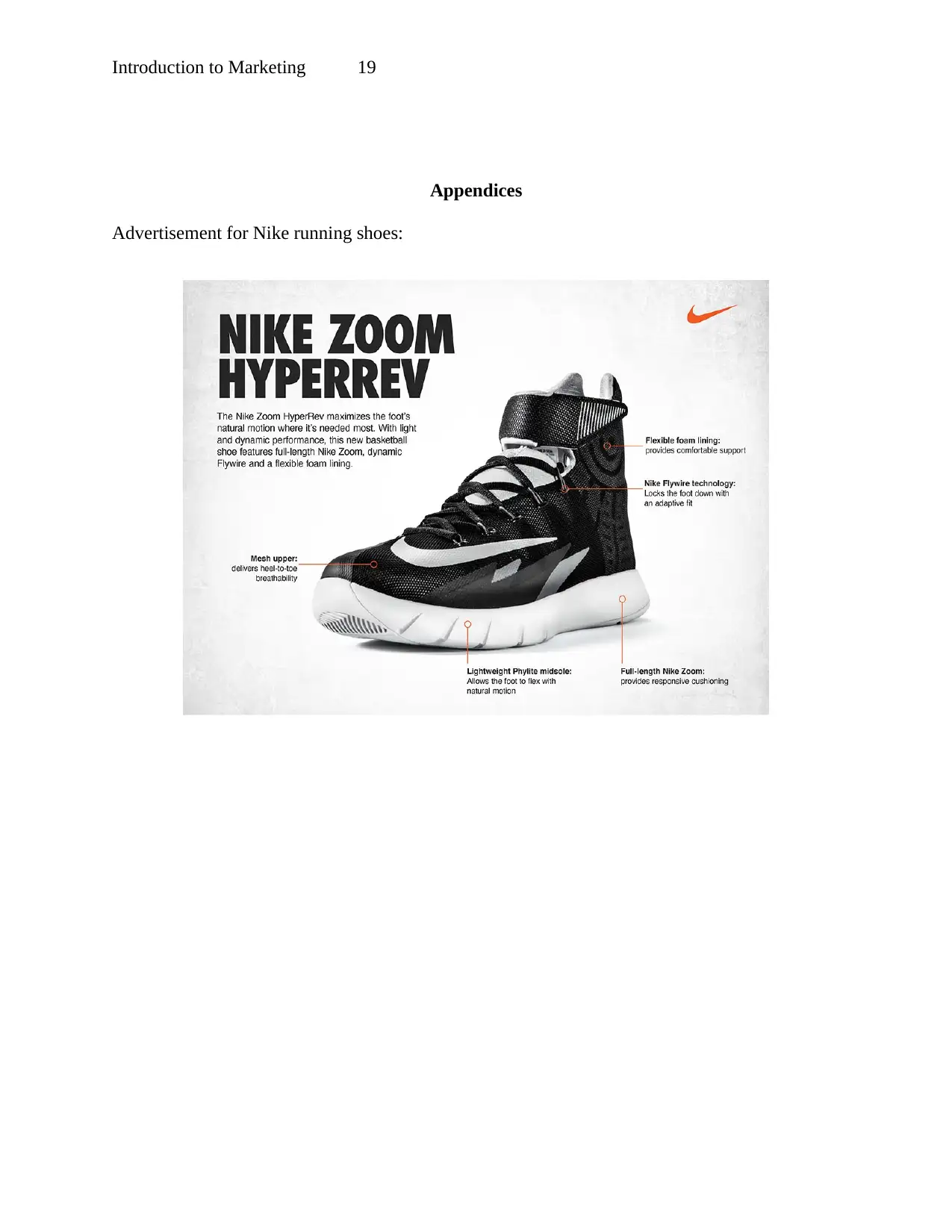
Introduction to Marketing 19
Appendices
Advertisement for Nike running shoes:
Appendices
Advertisement for Nike running shoes:
1 out of 20
Related Documents
Your All-in-One AI-Powered Toolkit for Academic Success.
+13062052269
info@desklib.com
Available 24*7 on WhatsApp / Email
![[object Object]](/_next/static/media/star-bottom.7253800d.svg)
Unlock your academic potential
© 2024 | Zucol Services PVT LTD | All rights reserved.





